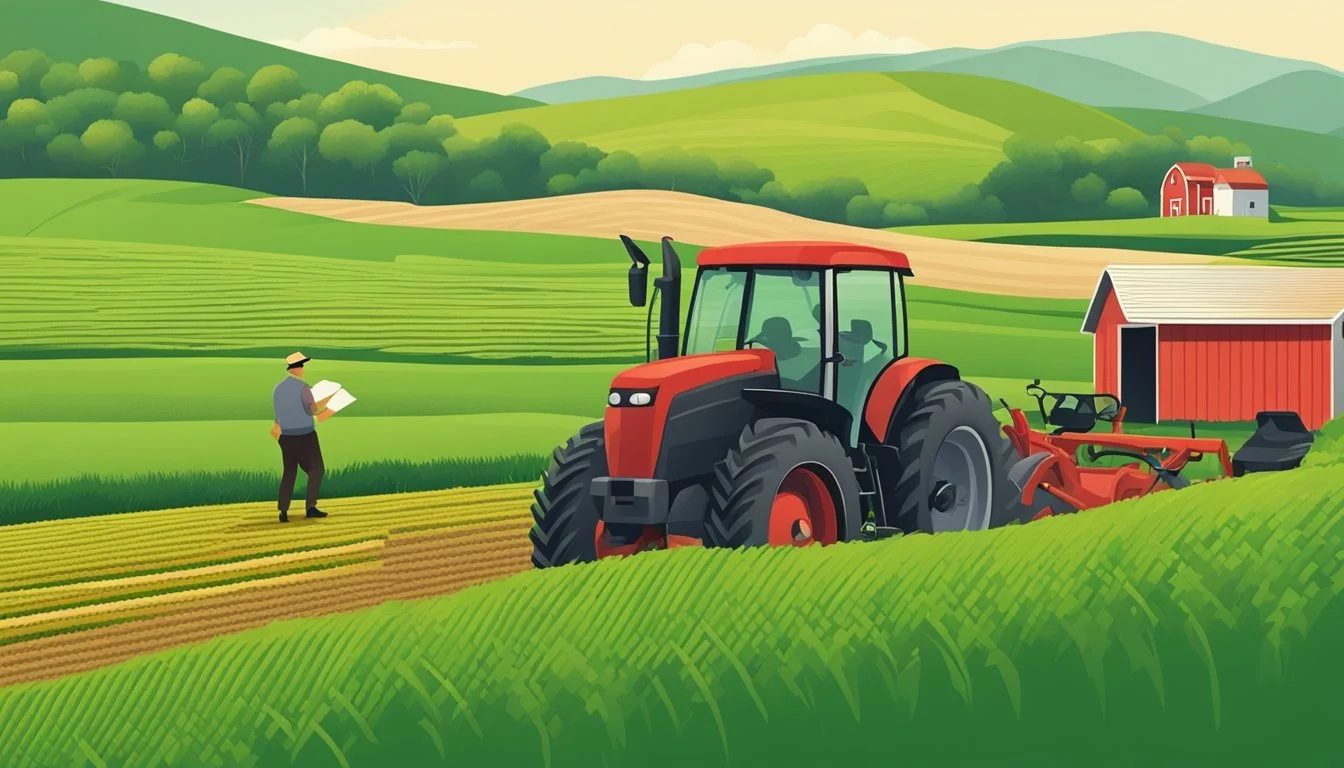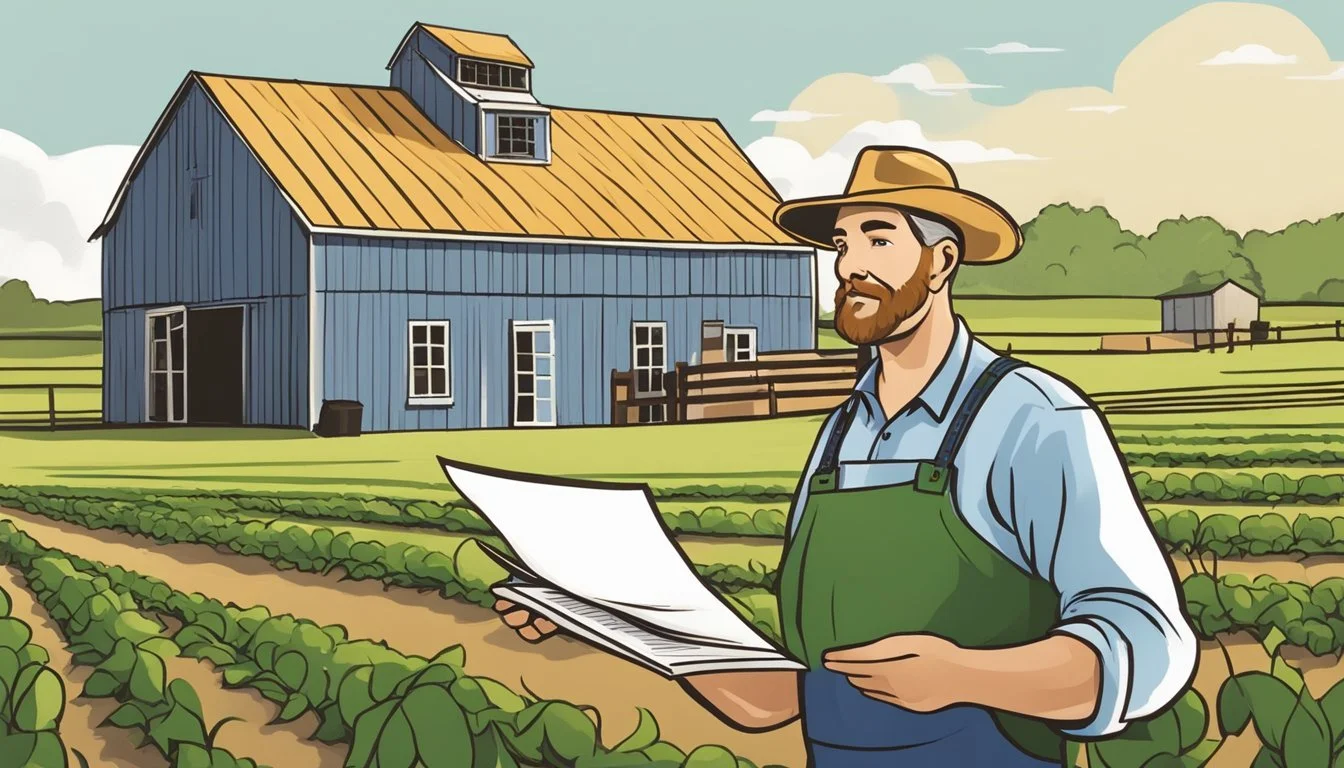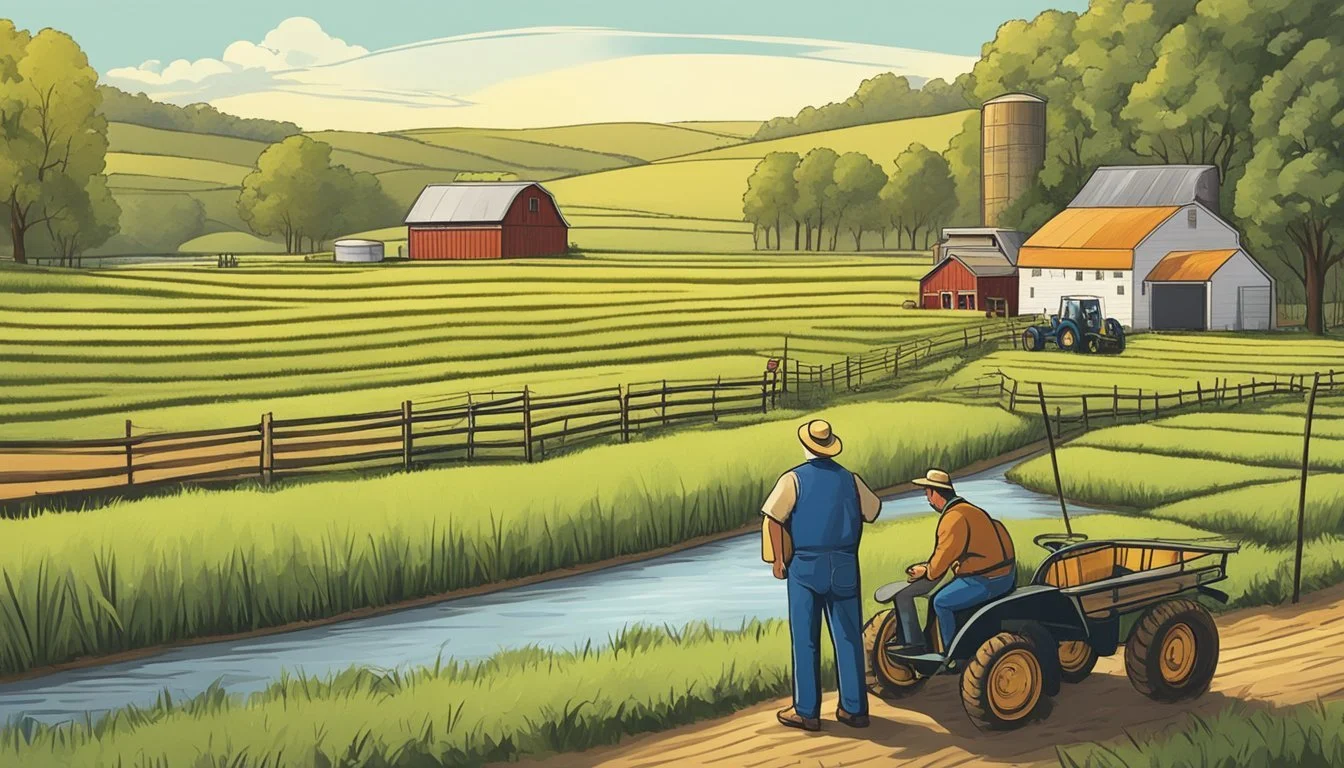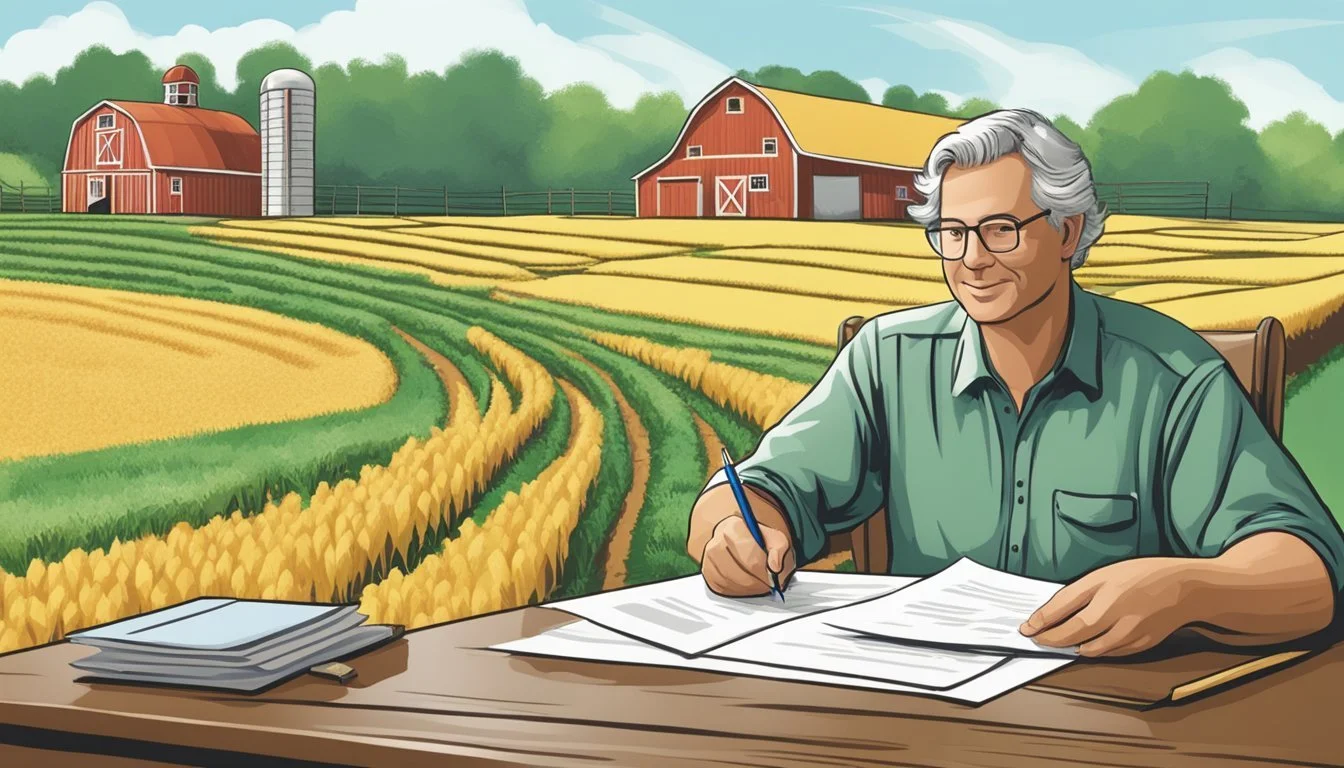Farm Loans in Delaware
Navigating Your Financing Options
This Article is Part of Our Guide on Farm Loans for All 50 U.S. States
Farm loans play a critical role in sustaining and growing agricultural operations in Delaware. The state's rich agricultural heritage, combined with the availability of various loan programs, creates a conducive environment for farmers and ranchers to either start or expand their businesses. Through programs offered by the Delaware Department of Agriculture and the USDA Farm Service Agency, financial support is available to address the wide range of needs that exist within the farming community.
One such initiative is the Young Farmers Program, which provides loans to assist new farmers in acquiring farmland. This program aims to ensure that the next generation of agricultural professionals can secure up to 70 percent of the appraised value of a farm's development rights, with the total loan amount not exceeding $500,000. The farms purchased under this scheme are then placed into a permanent preservation easement, thereby safeguarding Delaware's farmland for future agricultural use.
Additionally, the USDA Farm Service Agency in Delaware supports the state's rural economy by offering Guaranteed Farm Loan Programs. These programs facilitate the acquisition of loans from USDA-approved commercial lenders at reasonable terms to finance farmland purchases or agricultural production. Moreover, local initiatives like the Poultry House Demolition Assistance Program underscore the tailored support available for specific agricultural needs in Delaware, further exemplifying the state's dedication to its agricultural sector.
Overview of Farm Loans in Delaware
Delaware offers a range of farm loans tailored for the agricultural sector, providing vital financial assistance through various programs managed by state-based institutions.
Types of Farm Loans Available
In Delaware, farmers can access multiple loan types, each catering to specific needs within the agricultural community. Farm Plus Financial specializes in farm loans across the United States and offers competitive rates for land acquisition. Additionally, the Young Farmer Loan Program supports newcomers in the industry with a 30-year, no-interest loan to help with farmland purchases, proving crucial for business start-ups.
Role of Delaware Department of Agriculture
The Delaware Department of Agriculture (DDA) plays a pivotal role in the administration of farm loans and grants. They oversee programs designed to preserve farmland and provide planning assistance, ensuring that farmers receive the guidance they need for loan applications and financial planning. Their influence is crucial in connecting farmers with appropriate financial resources.
Importance of Farm Loans for Local Economy
Farm loans are an essential lifeline for Delaware's rural economy. They enable farmers to maintain and expand their operations, which in turn bolsters local economies. By providing the necessary credit, these loans help in overcoming the barriers to land acquisition and necessary investments, securing the future of agriculture within the state.
Loan Application Process
The application process for farm loans in Delaware involves an assessment of borrower eligibility, compilation of necessary supporting documents, and adherence to specific submission guidelines.
Eligibility Criteria
Farm loan applicants in Delaware must meet certain eligibility criteria set forth by the lending institution, such as the Delaware Department of Agriculture (DDA) or the USDA's Farm Service Agency (FSA). Typically, criteria may include:
Age Requirements: For some programs like the Young Farmers Program, there may be age restrictions.
Experience: A minimum number of years of farming experience or sufficient agricultural know-how.
Financial Requirements: An assessment of credit history and the economic viability of the farm business plan.
Necessary Documentation
Borrowers are required to provide a range of supporting documents as part of their loan application. These usually include:
Business Plan: A detailed farm business plan including farming goals.
Financial Records: Income statements, balance sheets, and cash flow projections.
Property Appraisals: For certain programs, appraisals related to the value of development rights may be needed.
Application Submission Guidelines
Applications must be submitted in accordance with the guidelines of the overseeing agency. For most loans in Delaware, the process includes:
Deadlines: Submission within the specified application period (e.g., April 19 to June 19, 2023, for Delaware Council on Farm & Food Policy loans).
Online or In-Person: Some agencies like the USDA offer online application portals, while others may require in-person submission at a local service center.
Farm loan applications are thorough to ensure that funds are distributed to qualified borrowers with a well-documented plan for success. Applicants should carefully follow all application instructions to improve their chances of receiving a loan.
Specific Loan Programs
Delaware offers a variety of loan programs tailored to support the agricultural sector. These programs are designed to provide financial assistance to farmers for purchasing land, recovering from natural disasters, and supporting young and beginning farmers.
USDA Farm Loan Programs
The USDA's Farm Service Agency (FSA) is a key provider of loans for farmers across the nation, including Delaware. The FSA offers Emergency Conservation Program (ECP) loans, which assist in the rehabilitation of farmland damaged by natural disasters and facilitate emergency water conservation efforts during drought. Furthermore, the Inflation Reduction Act has allocated funds for the USDA to offer relief to distressed borrowers with certain FSA direct and guaranteed loans.
State-Funded Loan Programs
Delaware’s Department of Agriculture administers programs like the Young Farmers Loan Program, established to support new farmers by offering 30-year, no-interest loans. These loans make farmland acquisition more accessible, addressing one of the greatest barriers for young farmers starting their businesses. The state also encourages applications to the First State Food System Program, fostering a stronger farm and food policy.
Private Lending and Grants
Farm Plus Financial is a commercial lender specializing in farm land loans. This entity provides farmers with the capability to calculate monthly payments and apply for loans to finance farm growth. Additionally, the agricultural sector in Delaware can access various grants and private loans, often with favorable terms to support farm sustainability and advancement.
In these programs, financial institutions, commercial lenders, and government agencies converge to offer a robust support system to the farming community in Delaware.
Loan Terms and Conditions
In Delaware, farmers seeking loans can find a variety of terms and options tailored to their needs. Loan terms and conditions are crucial for both the initiation and continuation of agricultural operations.
Interest Rates and Repayment
Farm loan interest rates are competitive and depend on the loan type and lender policies. For instance, the Young Farmer Loan Program provides a 30-year, no-interest loan to assist young farmers with land purchase. Repayment schedules are often aligned with the farmer's operational cash flow, ensuring they can manage payments without compromising their agricultural business.
Loan Security and Collateral
Loans typically require collateral, commonly in the form of the assets financed, such as land or equipment. The Farm Service Agency (FSA) necessitates adequate security for all its loans, with the loan amount usually limited to the value of the security offered.
Refinancing and Loan Modification Options
Borrowers facing financial challenges may have access to refinancing and loan modification options. The USDA Farm Service Agency was allocated funds specifically to provide relief for distressed borrowers, facilitating the restructuring of existing debt under new terms to prevent foreclosure. Options may include modifying repayment terms, reducing interest rates, or obtaining bridge loans for continuity of farming operations while longer-term solutions are developed.
Support for Beginning and Young Farmers
Beginning and young farmers in Delaware have access to several supportive programs aimed at facilitating their entry into the agricultural industry. These initiatives offer financial assistance, guidance, and resources necessary for establishing a successful farming enterprise.
Microloans and Youth Loans
Microloans: These are streamlined financial options tailored for small, new operations, allowing beginning and young farmers to cover essential start-up costs. Microloans present a more accessible alternative to traditional financing, with lower capital requirements, more straightforward application processes, and flexible usage that includes:
Operating Expenses: Seed, livestock, equipment rental
Capital Purchases: Equipment, minor farm improvements
Youth Loans: Specifically designed for individuals under the age of 20, youth loans support projects for those participating in 4-H clubs, FFA, or similar organizations. They are aimed at nurturing an early interest in agriculture through small grants that fund projects teaching responsibility and the basics of farm management.
Mentorship and Training Programs
Mentorship and training programs are essential to help beginning and young farmers gain the skills and knowledge required to thrive in the agricultural sector. Through these programs, seasoned farmers share their expertise, offering guidance on best practices in sustainable farming, business management, marketing, and technical skills. These mentorships often pair new entrants with experienced mentors and provide hands-on training opportunities.
Farmers.gov Resources
Farmers.gov is an invaluable online resource for farmers in the United States, offering a dedicated section for beginning farmers. The website provides comprehensive information on various topics, including:
Farm Loans: Details on loan options, eligibility, and how to apply.
Disaster Assistance: Information for recovery from natural disasters and emergencies.
Conservation Programs: Guidance on how to utilize and protect natural resources for sustainable farming practices.
The portal simplifies the process of finding and applying for the relevant programs, ensuring that young and beginning farmers have the foundational support to navigate the complexities of modern farming.
Farm Management and Sustainability
Farm management in Delaware encompasses a comprehensive approach to sustainability and conservation, integrating cutting-edge agricultural technologies and adaptive market strategies to ensure long-term productivity and environmental health.
Conservation and Environmental Practices
Delaware's farmers recognize the importance of conservation easements and climate-smart food and forestry practices to maintain the balance between productive farming and ecological preservation. They often engage in:
Cover cropping: To improve soil health and reduce erosion.
Pollinator habitats: Enhancing biodiversity by protecting bee populations crucial for specialty crops.
Such practices contribute not only to the sustainability of their farms but also to the wider regional ecosystem.
Modern Agriculture Technologies
In embracing modern technologies, farmers optimize resources and increase efficiency. This incorporates:
Precision agriculture: Using GPS and data analytics to ensure optimal planting, watering, and harvesting.
Renewable energy: Implementing solar or wind power solutions to decrease reliance on nonrenewable energy sources.
These technological advancements are pivotal in making Delaware agriculture resilient and sustainable.
Market Development and Diversification
Market development is key for Delaware's farm sustainability, encouraging a move beyond traditional commodities to embrace specialty crops and niche markets. Strategies include:
Direct marketing: Selling products locally through farmers' markets or CSA (Community Supported Agriculture) to build community ties and reduce transportation emissions.
Value-added products: Creating secondary products from primary crops, increasing profitability and market appeal.
Through diversification, Delaware's farmers can access new markets, bolstering economic resilience against market fluctuations.
Risk Management and Insurance
Effective risk management is a cornerstone of successful farming operations in Delaware. It involves understanding various insurance options and strategies to mitigate the effects of unpredictable natural events and market fluctuations on crop and livestock production.
Understanding Crop Insurance
Farmers in Delaware can take advantage of Crop Insurance programs to protect against the loss of their crops due to natural disasters or drops in commodity prices. These programs typically cover a percentage of the expected revenue based on crop yields and market prices. Specifically, dairy and other commodities can also be covered by such insurance policies, ensuring that agribusinesses have a safety net in place.
Coverage Types: Yield-based and revenue-based.
Crops Covered: Corn, soybeans, (how long do soybeans last?) wheat, and others.
Premiums: Partially subsidized by the USDA, premium amounts vary.
Protection Against Natural Disasters
Natural disasters can cause devastating losses to agribusinesses. To manage these risks:
Federal Emergency Loans may be available for recovery after disasters.
Prevent Plant Insurance provides coverage if weather prevents planting by a certain date.
Conservation Programs help to implement practices that reduce disaster risk.
The policyholder must file a claim and undergo an assessment to receive compensation.
Managing Market Volatility
Market volatility poses a significant financial risk to farmers and can result from a variety of factors, including global supply and demand shifts.
Futures contracts and options are financial tools used to hedge against price volatility in agricultural markets.
Price Loss Coverage (PLC) program supports farmers when market prices fall below the established reference prices for covered commodities.
Agriculture Risk Coverage (ARC) helps to protect against lower revenues due to price declines and yield failures.
These tools and programs work together to create a comprehensive risk management framework for Delaware's farmers, ensuring stability for their agribusinesses in the face of unforeseen challenges.
Federal and State Support Programs
In Delaware, farmers benefit from various federal and state support programs tailored to enhance agricultural operations and ensure sustainability. These initiatives are designed to offer financial assistance and bolster the farming community.
Biden-Harris Administration Initiatives
The Biden-Harris Administration has introduced several agriculture-focused initiatives, providing support through federal channels. A standout program is the Discrimination Financial Assistance Program, targeting individuals who faced discrimination in historical USDA lending programs. This initiative falls under the Inflation Reduction Act's aim to rectify past inequities and strengthen the agricultural sector's foundation.
USDA Financial Programs
The U.S. Department of Agriculture (USDA) offers a suite of financial programs to Delaware farmers. Notably, the Farm Service Agency (FSA) administers Farm Operating Loans with a ceiling amount of $400,000 to eligible borrowers for farm and forest operations. During the fiscal year 2021, Delaware farmers received over $54.6 million in payments and loans, with significant funding directed for pandemic assistance.
Key USDA-FSA Programs:
Operating Loans: Up to $400,000 for eligible borrowers
Microloans: A subdivision of Operating or Farm Ownership Loans
Cost-Share Assistance and CCC Programs
The USDA also operates cost-share assistance programs that partially reimburse farmers for specific agricultural expenditures. Additionally, the Commodity Credit Corporation (CCC) provides a crucial financial framework, supporting various USDA programs that offer marketing assistance, price support, and foreign purchase incentives, ensuring farmers are equipped to meet domestic and international market demands.
Notable Programs Supported by CCC:
Marketing Assistance Programs
Price Support Initiatives
Export Credit Guarantee Programs
These comprehensive efforts reflect both the federal and Delaware state governments' commitment to supporting farmers through financial backing and instrumental resources.
Economic Development and Infrastructure
In Delaware, economic development and infrastructure are pivotal to supporting and advancing the agricultural sector. These efforts focus primarily on investing in rural infrastructure, promoting local and regional food systems, and enhancing food supply chain resilience.
Investing in Rural Infrastructure
USDA Rural Development plays a crucial role in advancing prosperity in Delaware by funding essential infrastructure. Investments include building and maintaining high-speed internet networks, as well as water and waste treatment systems, which are foundational for rural community development and efficient agricultural operations.
Promoting Local and Regional Food Systems
The Delaware Department of Agriculture and USDA programs work collaboratively to bolster local and regional food systems. These initiatives provide critical support to farmers markets and local food hubs, which stimulate economic growth by connecting farmers directly with consumers and creating local jobs.
Enhancing Food Supply Chain Resilience
In light of recent disruptions, enhancing the food supply chain's resilience is paramount. Programs such as those under the USDA Farm Service Agency are designed to provide emergency funding to rehabilitate farmland affected by natural disasters and implement emergency conservation measures during severe droughts, thus securing the food production line in adverse conditions.
Relevant Resources and Services
Farmers in Delaware have access to a variety of resources and services aimed at providing financial support and guidance. These offerings ensure that agriculture professionals can sustain and enhance their farming operations through a range of programs and tailor-made assistance mechanisms.
Farm Loan Program Tools and Services
The USDA Farm Service Agency (FSA) offers the Farm Ownership Loans, which empower farmers to purchase or expand their properties. Applicants can utilize these loans for various purposes such as buying land, covering closing costs, and funding the construction or improvement of farm buildings. Additionally, the Loan Assistance Tool on the Farmers.gov website serves to guide potential borrowers through the loan application process.
Customer Service and Repayment Options
Services that facilitate loan management are paramount. For instance, the "Pay My Loan" feature on the Farmers.gov portal enables seamless loan repayments, enhancing the borrower's experience. Comprehensive customer service is provided by the FSA, offering personalized assistance to loan borrowers, including guidance on repayment plans and other financial measures.
Outreach and Education
Education plays a crucial role in the success of farming enterprises. Programs like 4-H clubs and the Future Farmers of America (FFA) foster youth education and involvement in agriculture. Alongside these, the University of Delaware Cooperative Extension and Delaware State University Cooperative Extension provide ongoing education and outreach to the farming community, ensuring farmers remain informed on best practices and innovations in the field.









